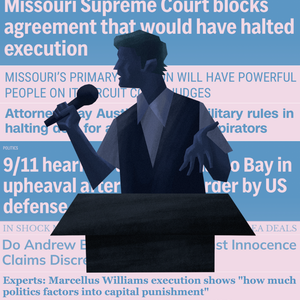
The Supreme Court has consistently held that “death is different”: the “qualitative difference between death and other penalties calls for a greater degree of reliability when the death sentence is imposed.” As a result, capital defendants pursue a series of mandatory and discretionary appeals to ensure that mistakes of constitutional significance are identified and corrected. However, death-sentenced prisoners in Louisiana recently argued that the state issued execution warrants before they had exhausted their appeals, and the state high court agreed to recall the warrants. When a state pursues executions before prisoners receive the full measure of due process to which they are entitled, the fairness, accuracy, consistency, and transparency of the death penalty are called into question — imperatives that the appeal process is intended to ensure.
On April 11, the Louisiana Supreme Court recalled death warrants for Darrell Draughn and Marcus Reed, agreeing with the two men that a judge must consider their state post-conviction claims before setting execution dates. Mr. Draughn had been scheduled for execution on May 28 and Mr. Reed on June 4. The per curiam (unsigned) decision noted that the court had previously ordered the appointment of post-conviction counsel for the men, and their post-conviction appeal claims heard, “before signing the warrant of execution.”1 Instead, a lower court judge had signed execution warrants at the request of the state before either man had been able to file a post-conviction appeal with the assistance of a lawyer.
Time and time again the United States Supreme Court has reminded us “death is different” because that sentence, once imposed, cannot be rectified. It is incumbent on our system of justice to ensure the imposition of the sentence is properly applied, not in haste, but without delay for the sake of delay. Prudence dictates that proceedings must be expedited in a logical manner which ensures the rights of both the state and the defendant are properly protected and not lost in an effort to hastily resolve the matter.

A death-sentenced prisoner has the right to a “direct appeal” of their conviction and death sentence, where the state supreme court reviews the trial record for errors.2 Prisoners are constitutionally entitled to representation during this direct appeal. If the direct appeal is denied, prisoners may file a “post-conviction” appeal in state court, where they can for the first time raise claims about evidence outside the trial record, such as ineffective assistance of trial counsel, prosecutorial misconduct, or newly discovered evidence of innocence. Though prisoners do not have a constitutional right to an attorney during post-conviction appeals, it is common practice for counsel to be appointed in capital cases due to the “heightened” fairness concerns raised by the death penalty. If the state courts deny the death-sentenced prisoner’s post-conviction appeal, he may raise those claims in federal court in a process known as “habeas corpus” review. The federal appeal reviews the state court decisions for “reasonableness” and compliance with U.S. Supreme Court precedent. The prisoner’s appeals are typically considered “exhausted” once the U.S. Supreme Court denies review of the federal courts’ judgment.
Both Mr. Draughn and Mr. Reed had completed only their direct appeals before state officials requested their execution dates, meaning no state or federal court had ever considered the types of constitutional claims regarding defense representation or prosecutorial misconduct that can only be brought during the post-conviction process. After the Supreme Court denied their direct appeals, both men filed “shell” post-conviction petitions on their own, with the expectation (pursuant to past state law and practice) that an appointed attorney would later supplement the petition with case-specific claims. Louisiana law requires counsel to be appointed for capital state post-conviction proceedings “if appropriate.” However, due to apparent delays in representation and court review, neither man ever filed an amended post-conviction petition with the assistance of a lawyer. The state argued that the men had forfeited their post-conviction claims as a result, making them eligible for execution, while defense attorneys argued that the state or the courts had prevented the petitions from being filed. It would be “unheard of in both this state and the nation” for a prisoner to be “pushed towards an execution without any court hearing his state post-conviction or Federal Habeas claims,” Mr. Draughn’s attorneys said.
The unique nature of the death penalty not only necessitates additional protections during pretrial, guilt, and sentencing phases, but also enhances the importance of the appellate process. […] Meaningful appellate review in capital cases…serves as a check against the random or arbitrary imposition of the death penalty.

In Mr. Draughn’s case, the Louisiana Supreme Court denied his direct appeal in 2007 and he filed a shell petition to begin the post-conviction process. In 2011, he requested an extension to file a petition with attorney support, but a judge never ruled on the motion and there were no further developments in the case until the state asked for an execution date this year.
Mr. Reed’s direct appeal concluded in 2017 and he filed a shell petition while his attorneys began working on a more detailed supplement to the petition, due at the end of 2019. However, before the full petition was filed, the district attorney’s office asked the court to remove Mr. Reed’s lead attorney Blythe Taplin from the case on the grounds that Ms. Taplin had also represented Mr. Reed on direct appeal. The court removed Ms. Taplin and stayed the deadline for the petition, but Mr. Reed was not appointed a new lawyer and no amended petition was filed until after the execution warrant was issued this year. Ms. Taplin contends that the DA sought to remove her because she had filed records requests with the DA’s office. “It’s shocking to see that the DA is now asking for an execution warrant and complaining about delay, given the role that his office has played,” she told The Advocate.
The Louisiana Supreme Court held that the men must be able to submit their post-conviction petitions, with the assistance of counsel, for consideration by a judge before an execution date is set. “The Louisiana Supreme Court recognized the fundamental principle that the state cannot send a man to the death chamber without at least allowing him to exhaust his appeals,” said Cecelia Kappel, an attorney for Mr. Draughn. “If prisoners can be executed before they have completed all of their appeals, by warrants signed under cover of darkness, then all of our rights are seriously in jeopardy.”
State v. Reed, 2025-KD-0043 (La. 2025) and State v. Draughn, 2025-KD-00424 (La. 2025); Brian McCallum, Caddo judge sets deadline, hearing date in Marcus Reed death penalty proceedings, The Shreveport-Bossier City Advocate, April 11, 2025; John Simerman, Louisiana Supreme Court rejects latest death warrants; execution dates off, The Times-Picayune | The New Orleans Advocate, April 11, 2025; John Simerman, Two Louisiana inmates ask state Supreme Court to tear up death warrants scheduling execution, The Advocate, April 3, 2025; LA Rev. Stat. § 15:178 (2024); Murray v. Giarratano, 492 U.S. 1 (1989); Lockett v. Ohio, 438 U.S. 586 (1978).
-
Emphasis in original.↩︎
-
In most states, a direct appeal is mandatory for death-sentenced prisoners. All other death penalty states give death-sentenced prisoners the right to a direct appeal. Louisiana permits prisoners to waive their direct appeals. See State v. Bordelon (La. 2009). ↩︎
Louisiana
Mar 19, 2025

Louisiana Resumes Executions After 15-Year Hiatus with First Nitrogen Gas Execution
Arbitrariness
Oct 04, 2024
